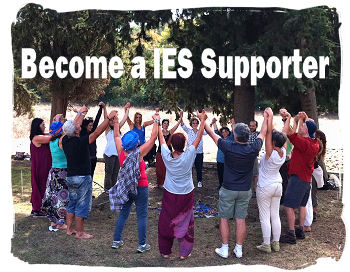 IES Training 2017 in Sardegna, alla IES School italiana Ecopsiché
IES Training 2017 in Sardegna, alla IES School italiana Ecopsiché
The basic training course recognized by IES is called International Training in Applied Ecopsychology: Ecotuning Training.
It is a training open to all those who have skills, interest and passion in human relationships, in the practice of facilitation, in conducting outdoor activities and who want to enrich their professionalism, or even simply their personal life. It gives the ability to operate an Ecotuner: who works as a facilitator of the relationship with Nature, as a conductor of ecopsychologically oriented activities. This training is also designed for those wishing to develop a personal or institutional project inspired by sustainability.
The Course is conducted in several international IES Schools, twinned with each other, and is organized according to a common scheme. Students can complete the whole training exclusively in one IES School or complete the training in different IES Schools around the world. Each School has its own peculiarity and specialization, and different number of hours for each section, but the core of the training, the vision and the methodology are common.
It is not necessary to be a psychologist or even an ecologist to follow an Ecotuning training and be able to operate in this area. The term “Ecotuning” itself, the art of conducting the activities of Applied Ecopsychology, and the term “Ecotuner”, the name of the professional who works there, were born precisely to give the possibility to everyone to apply Ecopsychology in their work and life. Naturally, every professional will have to stay within his field of competence, enriched by the encounter with the theory and practices of Ecopsychology, but with a clear awareness of the boundaries of his professional qualification.
Ecotuning Training also optimizes interpersonal and communication skills of the Ecotuner, making them good communicators and promotors of a wider vision of self and of the Planet.
Ecotuning Training is the basic training, the same for everyone. The various IES Schools also propose subsequent courses of study for professionals in certain areas: psychologists, psychotherapists, counselors, coaches, teachers, community process facilitators, trekking guides, etc.
These are the 5 training sections of Ecotuning Training
1. The theory of ecopsychology
- The history of Ecopsychology
Theodore Roszak, Robert Greenway, Joanna Macy, Paul Shepard, Bill Deval, Howard Clinebell, Ralph Metzner, Michael Cohen, Phillip Sutton Chard - Philosophy and ethics of the environment
Arne Naess, Thomas Berry, Aldo Leopold, Edward Wilson
Deep Ecology, American Transcendentalism, Ecojustice, Biophilia - Nature in myth and history
Carl Jung, Eric Fromm, Joseph Campbell, James Hilman, Rupert Shaldrake, ecofeminism - Psychology: analytical, humanistic, transpersonal, positive, evolutionary
Carl Jung, Abraham Maslow, Carl Rogers, Roberto Assagioli, Viktor Frankl, KenWilber, Stanislav Grof, Fritz Perls - Zooanthropology and Ethnobotany
Pet therapy, delphotherapy, hippotherapy, plant neurobiology, use of medicinal plants.
- Systemic visions
Fritjof Capra, Rupert Sheldrake, James Lovelock, Maturana & Varela
Ecology, native cultures, complexity theory, Gaia theory, family constellations - Theories of knowledge
Gregory Bateson, Edgar Morin
Shamanic visions, epistemology
2. Personal growth
Paths of self-knowledge (lights and shadows), dis-identification and self-identification, emotional intelligence, ability to recognize and withdraw projections, managing emotions, managing stress, building an ecological ego: ecoself.
3. Ecopsychology experiential seminars in nature
Experience in the natural environment ecopsychologically oriented, exploration of the 5 senses, creative activities (ecoart, dance, song, ecopoetry, creative writing), quests in the wilderness, day and night walks, training sense of orientation, sharing of experiences and activities, dialogue with the environment, with animals, centering and practice of green mindfulness, ecopsychotherapy, ecocounseling, green coaching.
4. Practice of Ecotuning and Art of Communication
Creation and management of activities, games and rituals. Skills in managing a group, managing conflicts, organizing and promoting events. Public speaking and educational skills. Making Ecopsychology a way of life and bringing it into the world.
5. Final project, individual, of Ecotuning
Organization of an Ecotuning event designed and conducted autonomously in a context of one’s choice. The prioject will be realized with the help of the School facilitators, the tutors and the training group, followed by a presentation to the class.
In order to complete the course and acquire the Ecotuner diploma, 270 hours of training plus the final project are required, with a minimum of 50 hours per training section.


Find out where to follow a training in Applied Ecopsychology










